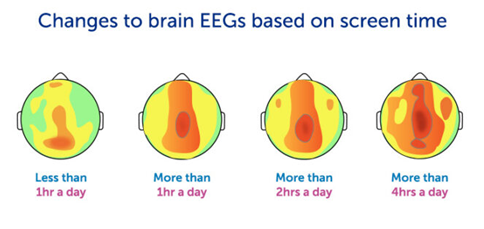It All Starts at Home
In today’s digital age, screens have become an integral part of everyday life. Recent research has shed light on the importance of completely eliminating screen time for infants and toddlers, under the age of 2. Screen time can have many adverse effects on developmental growth and well-being.

Technological devices provide instant gratification and entertainment, creating a strong attachment and dependency. According to a 2016 study by American Academy of Pediatrics, “Children younger than 2 years need hands-on exploration and social interaction with trusted caregivers to develop their cognitive, language, motor, and social-emotional skills. Because of their immature symbolic, memory, and attentional skills, infants and toddlers cannot learn from traditional digital media, as they do from interactions with caregivers, and they have difficulty transferring that knowledge to their 3-dimensional experience” (Hill, David MD et al, 2016). From the day that a baby is born, they progress through critical periods of development where they acquire sound production through heard speech and music, observe and understand facial expressions, and communicate by crying or cooing for different needs. Infants and toddlers learn best by observing their caregiver, modeling the behavior or speech, and parents reteaching behaviors. The American Academy of Pediatrics recommends avoiding digital media use (except supervised video-chatting) from the ages birth to 24-months. Screen time may lead to changes in brain activity, and issues with focusing and controlling impulses, behaviors, and emotions – which becomes evident when a child enters elementary school (Fliesler, Nancy, 2023). According to Dr. Carol Wilkinson, a developmental-behavioral pediatrician at Boston Children’s Hospital, “The infant brain thrives on enriching interactions with the environment, and excessive infant screen time can reduce opportunities for real-world interactions that are important to brain development . . . When screens are with us all the time, we need to better support parents in non-screen time tips and tricks to keep infants engaged and parents sane” (Babies and Screen Time: New Research Calls for Caution, 2023). Dr. Wilkinson continues to explain that if parents must expose children to screens prior to age 2, enrich the experience by singing along, commenting on characters, and imitating vocalizations to the child. Moreover, recent studies have found a concerning correlation between screen time for infants and the observation of slower brain wave patterns.
In a Singaporean study, pregnant mothers and a total of 400 children were analyzed from infancy to 9 years of age. Beginning at 12 months old, researchers had parents track the amount of time babies spent with screens throughout each week. At 18 months old, the researchers used encephalograms (EEGs) to study the infant’s brain waves. The EEG images concluded that the more time a child spent on a screen, the stronger their slower-frequency theta brain waves were, compared to high-frequency beta waves. Theta waves are connected to creativity, intuition, daydreaming, and fantasizing, and are a repository for memories, emotions, and sensations (NeuroHealth Associates, NHAHealth.com). Beta waves are for fast activity and the state that our brain is in when we are awake, listening, thinking, problem-solving, making decisions, and processing information. When the participants reached age 9, extensive neuropsychological testing continued with strict documentation of screen time hours and surveys completed by the parents. Researchers concluded that with every 1-hour increase in average screen time, children experienced more difficulties with attention and struggled more with executive functioning.
The study also concluded that families with very young children who are allowed to have excessive screen time often face additional challenges such as food insecurity, mood problems with parental figures, lack of impulse control, and empathy. Additionally, it’s been observed that screens can bombard infants’ developing brains with an overwhelming amount of stimuli.
 Screens are developmentally harmful to infants under 24 months old due to bombarding of fast-paced movements, ongoing blinking lights, and scene changes which require sufficient cognitive skills to understand and process what is being seen. Viewing screens causes infant brains to overwhelm, resulting in inadequate resources for the child to mature in cognitive skills and executive functions. It’s evident that brain-building play is crucial for the development of infants and toddlers, as it enhances their cognitive abilities and fosters healthy brain development.
Screens are developmentally harmful to infants under 24 months old due to bombarding of fast-paced movements, ongoing blinking lights, and scene changes which require sufficient cognitive skills to understand and process what is being seen. Viewing screens causes infant brains to overwhelm, resulting in inadequate resources for the child to mature in cognitive skills and executive functions. It’s evident that brain-building play is crucial for the development of infants and toddlers, as it enhances their cognitive abilities and fosters healthy brain development.
Babies and young toddlers develop skills for thinking, communicating, recollection, and imagining through age appropriate play, interactions, and opportunities to explore their environments. As concerns rise over the lasting effects of screens – it’s time to go back to basics and prioritize hands-on activities, personal interactions, and meaningful conversational games to help your baby develop crucial skills that are a foundation of lifelong health.
SOURCES:
https://healthysd.gov/screens-
https://www.unicef.org/

